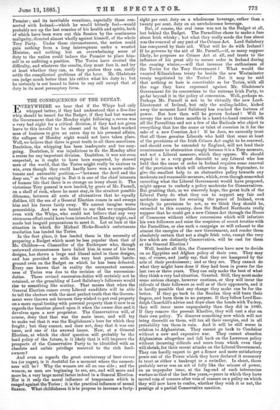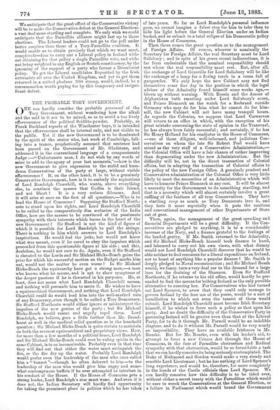THE CONSEQUENCES OF THE DEFEAT.
EVERYWHERE we hear that if the Whips had only whipped better, if they had understood that a five-line whip should be issued for the Budget, if they had but warned the Government that the Monday night following a recess was a very bad night for a critical division, if they had not given leave to this invalid to be absent and to that hard-worked man of business to give an extra day to his personal affairs, the collapse of Monday night would not have taken place. Well, we believe that there is great truth in all these assertions. Doubtless, the whipping has been inadequate and too easygoing. Doubtless, it was injudicious to fix the Monday after a recess for any important division. Doubtless, it was not even suspected, as it ought to have been suspected, by shrewd men of the world, that the Tories might really be anxious to win, even though they could hardly have won a more unfortunate and untenable position,—" between the devil and the deep sea," as the saying is. But it is one of the chief interests of human life that there is so strange an irony about it. The victorious Tory general is now landed, by grace of Mr. Parnell, on a shelf of rock, where he must stay, in the straitest possible dilemma, between all sorts of alternatives that he equally dislikes, till the sea of a General Election comes in and sweeps him and his forces fairly away. We cannot imagine worse generalship. And we are bound to say that we sympathise even with the Whips, who could not believe that any very strenuous effort could have been intended on Monday night, and made but languid preparations to meet it. Let us look at the situation in which Sir Michael Hicks-Beach's unfortunate resolution has landed the Tories.
In the first place, it has landed them in the necessity of preparing a Budget which must be less popular than that of Mr. Childers—a Chancellor of the Exchequer who, though untoward circumstances have foiled him in some of his best, designs, has shown a large and liberal mind in those designs, and has provided us with the very best possible battleground even on the Budget on which he has been defeated. Every one knows that in reality the unexpected earnestness of Tories was due to the revision of the successionduties. These revised succession-duties will certainly not be retained, or the grumbling of Lord Salisbury's followers would rise to something like mutiny. That means that when the General Election comes every Liberal candidate will be able to tell the electors with the most perfect truth that the Government were thrown out because they wished to put real property on a more equal footing with personal property than it now is as regards the taxation placed upon it when the owner dies and it devolves upon a new proprietor. The Conservatives will, of course, deny that that was the main issue, and will try to make out that it was the Englishman's beer for which they fought ; but they cannot, and dare not, deny that it was one issue, and one of the avowed issues. Now, at a General Election, at which the chief question will probably be the land policy of the future, is it likely that it will improve the prospects of the Conservative Party to be identified with an obsolete and unfair privilege reserved to the rich landowners I And even as regards the great controversy of beer versus tea (or sugar), is it doubtful for a moment where the earnestness will be Why the women are all on one side ; and the women, as men are beginning to see, are, and will more and more be, a very large moral factor indeed in a General Election. Nor is it only the moral influence of temperance which is ranged against the Tories ; it is the practical influence of sound finance. What childishness it is to propose to increase a forty
eight per cent. duty on a wholesome beverage, rather than a twenty per cent. duty on an unwholesome beverage.
But, of course, the real issue was not in the Budget at all, but behind the Budget. The Parnellites chose to make a fuss about Irish whisky ; but what they really made the fuss about was the renewal of any part of the Crimes Act. Lord Salisbury has conquered by their aid. What will he do with Ireland V If he governs by the aid of Mr. Parnell,—if, as many suppose likely, he proposes no Crimes Act at all, and trusts to the influence of his great ally to secure order in Ireland during the coming winter,—will that increase the enthusiasm of the Tories for the Tory Government I What would the vaunted Kilmainham treaty be beside the new Westminster treaty negotiated by the Tories ? But it may be said that nothing so base is conceivable as for Tories, with all the rage they have expressed against Mr. Gladstone's Government for its concessions to the extreme Irish Party, to go far beyond it in the policy of concession. Well, perhaps so. Perhaps Mr. Parnell is not to be virtually the new LordLieutenant of Ireland, but only the scaling-ladder, kicked away the moment Lord Salisbury has reached the fortress of power. But how then will he govern Ireland Will he occupy the next three months in a hand-to-hand contest with all the Parnellites and not a few of the Radicals who object to everything that has the name or taint of coercion in it for the sake of a new Coercion Act ? If he does, we earnestly trust that all those genuine Liberals who hold that some at least of the provisions of the Irish Crimes Act ought to be renewed, and should even be extended to England, will not lend their countenance to obstruction simply because it is a Tory measure, and not a Liberal measure, which they oppose. We should regard it as a very great discredit to any Liberal who has held that the cause of order in Ireland requires some renewal of the provisions which will otherwise drop in September, to give the smallest help to an obstructive policy towards any moderate and reasonable measure, which, even though somewhat exceeding what the Liberal Government would have proposed, might appear to embody a policy moderate for Conservatives. But granting that, as we sincerely hope, the great bulk of the Liberal Party do what they can to support any fair and moderate measure for securing the peace of Ireland, even though its provisions be not, as we think they should be, extended to this country, does Sir Stafford Northcote really suppose that he could get a new Crimes Act through the House of Commons without either concessions which will infuriate his own followers and raise the suspicion of secret treaties with the Pamellites, or else such a campaign as will exhaust to the utmost the energies of the new Government, and render them absolutely certain that not a single Irish vote, except the very few which are distinctly Conservative, will be cast for them at the General Election ?
Well, besides all this, the Conservatives have now to decide on an Egyptian and Afghan policy of their own. They may say, of course, and justly say, that they are hampered by the acts of their predecessors ; and so they are. They cannot do what they might have done if they had been in power for the last two or three years. They can only make the best of what they think a very bad situation. Granted. Still, they must make some serious change, however cautious, or they will incur the ridicule of their followers as well as of their opponents, and it is hardly possible that any change they make can be for the better. if they go back to the Soudan they will burn their fingers, and burn them to no purpose. If they follow Lord Ran dolph Churchill's advice and draw close the bonds with Turkey, they will incur more unpopularity than they did in 1880.
If they remove the present Khedive, they will cast a slur on their own policy. To discover something new which will not bring discredit on them, will tax all their energies, and in all probability tax them in vain. And it will be still worse in relation to Afghanistan. They cannot go back to Candabar without a new and expensive war. They cannot abandon Afghanistan altogether and fall back on the Lawrence policy without incurring ridicule and scorn from which even they will shrink, for their recent attacks on the Liberal Government.
They can hardly expect to get a firmer and more satisfactory peace out of the Power which they have declared it necessary to treat as either a bankrupt or a swindler. In short, there probably never was an act of folly like the seizure of power, on an unpopular issue, at the fag-end of such internecine warfare as that of the last five years,—years in which they have moved votg of censure after vote of censure on a policy on which they will now have to confer, whether they wish it or not, the prestige of a partial Conservative sanction. We anticipate that the great effect of the Conservative victory will be to make the Conservative defeat at the General Elections a vast deal more startling and complete. We only wish we could anticipate that the Parnellite alliance might last up to those elections. The Liberal leaders could not go to the poll under better auspices than those of a Tory-Parnellite coalition. It would enable us to obtain precisely that which we want most, complete freedom to carry out a Liberal policy in Ireland without obtaining for that policy a single Parnellite vote, and without being weighted in any English or Scotch constituency, by the ignominy of the support of a party who favour a Disunionist policy. To get the Liberal candidates Boycotted by the Irish extremists all over the United Kingdom, and yet to get them returned in a united phalanx 380 strong, would, indeed, be a consummation worth paying for by this temporary and insignificant defeat.



































 Previous page
Previous page